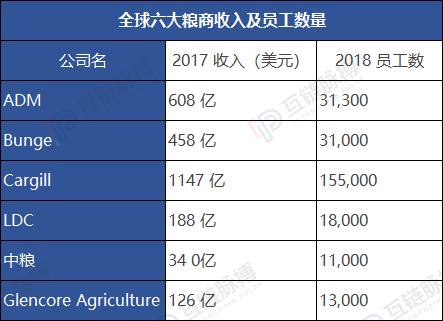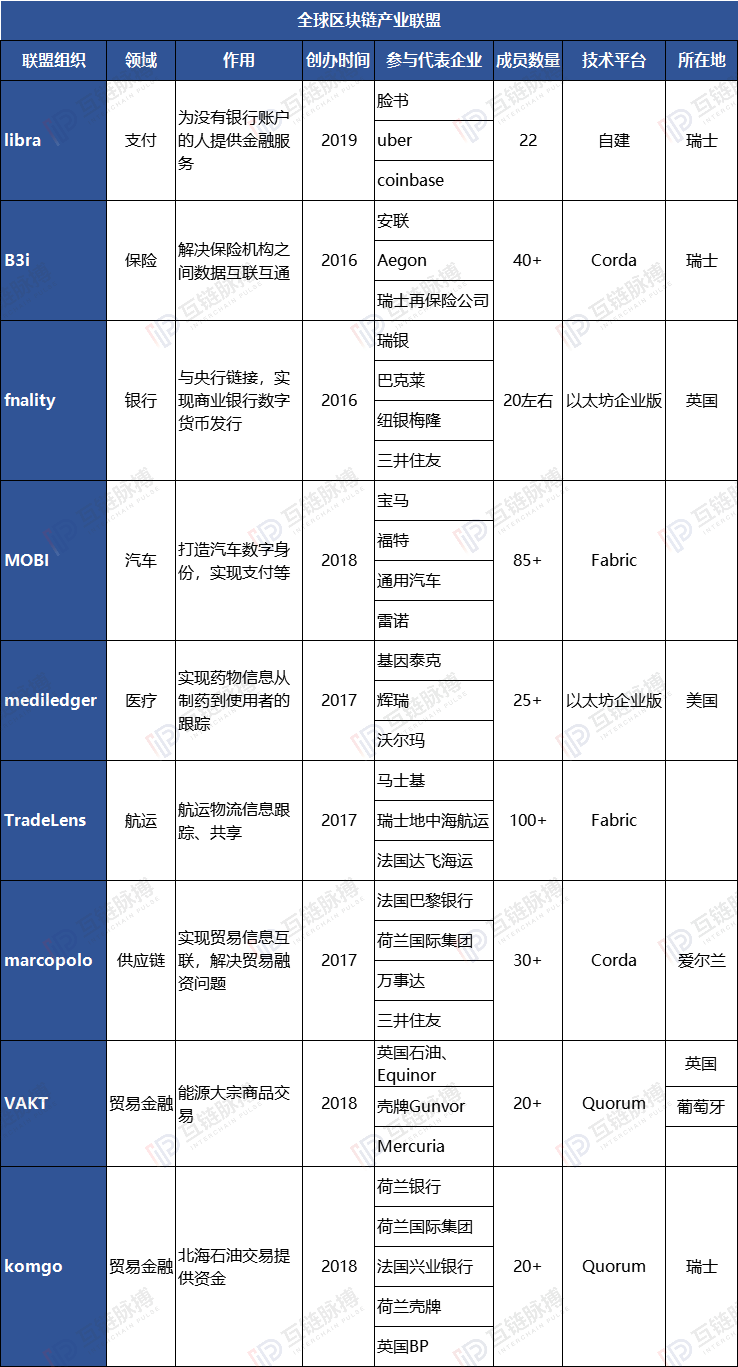New Path of International Cooperation for Chinese Enterprises Against Globalization: Blockchain Industry Alliance
Three years ago, the famous American food company AMD (Archer Daniels Midland Company) also regarded China ’s largest food company, COFCO, as a competitor. But now they are working together, and the link technology of cooperation is blockchain.
On March 31, the Swiss regulatory authority approved the legal entity of Covantis SA. This physical organization brings together the world's top grain merchants, including China's COFCO and ADM in the United States, as well as Bunge, Cargill, Louis Dreyfus and Glencore Agriculture. These six companies almost dominate the global grain trade. Covantis SA aims to build a food trading data platform through the blockchain to reduce transaction costs.
In recent years, Chinese companies' participation in international cooperation and overseas investment have been blocked frequently, and the epidemic has stimulated the trend of anti-globalization from behind the scenes to the foreground. The use of blockchain technology has given new paths to collaboration between multinational companies.
From opponent to partner
Founded in 1902, AMD is the largest agricultural company in the United States. Headquartered in Chicago, Illinois, the United States has 31,300 full-time employees (2018). About two-thirds of its revenue comes from processing soybeans, peanuts, and other oilseeds.
- This is the real blockchain! Tens of billions of dollars are put here, 4 industry experts bring you first-line experience
- FBI warning: under the new crown epidemic, beware of four encryption scams
- QKL123 market analysis | New days of global diagnosis? American Oolong! Data those things (0414)
AMD plus the United States Bunge (Bongi), the United States Cargill (Cargill), France Louis Dreyfus (Louis Duff) collectively known as the world's four major grain merchants, is the "ABCD" of the food industry. The Swiss-based Glencore Agriculture (Glencore) is a commodity trader with a turnover higher than that of Nestlé, Novartis and UBS.
These companies are all traditionally developed companies, and COFCO is a latecomer. But a Reuters report three years ago pointed directly at the impact of COFCO on traditional grain merchants.
In April 2017, Reuters noted an ADM personnel adjustment and added a chief risk officer. Prior to this, ADM withdrew from energy trading, planning to close its South African trade department and reduce its business in Argentina. In February of that year, ADM reported a 41% decline in net profit in the fourth quarter of 2016 to US $ 424 million, which was the company ’s second quarter loss in 2016.
On the one hand, ADM's dilemma was caused by lower food prices and lower transaction volume. On the other hand, it was caused by increased competition from the Chinese company COFCO Group, which had begun to expand into the international food market.
In 2018, ADM launched "Covantis SA" in conjunction with "BCD". The goal is to automate 60% of the tasks performed in the trade of commodities such as grain and increase the speed of transactions by 70%. By replacing manual processes, the plan hopes to reduce the error rate by 80% and reduce the amount of retyped data by 90%. Stefano Rettore, the chief risk officer who joined ADM in 2017, is in charge of this project.
In December last year, Covantis SA disclosed the latest developments, with COFCO and Swiss Glencore joining. At this point, the world's major grain traders gathered.
According to public information, the revenue of the six companies in 2017 reached 252.7 billion US dollars.

On March 31 of this year, Covantis SA was officially approved by the Swiss regulatory authorities, and each of the six major food merchants sent one person to form the board of directors. The chairman of the board of directors Six big grain merchants took turns as the chairman of the board of directors, and the French-based Louis Dreyfus Group sent directors to serve as the first chairman.
Under the framework of Covantis SA, based on the blockchain and related privacy protection technologies, the data of the six major grain merchants are shared and kept confidential, and the operation system of the global grain trade will be reinvented. It is especially important that the original competition is also transformed into cooperation.
In its external press release, COFCO emphasized that COFCO, as one of the co-founders of the Covantis program, will enhance China's position and voice in international agricultural trade.
Industrial country
The reason why Western grain merchants cooperate with COFCO is that China's huge grain trade and the role of COFCO in it are the leading factors, but the trust mechanism based on the blockchain system provides a technical basis for its cooperation.
According to reports, the Covantis SA solution will be built on Quorum, which is a blockchain system developed by JP Morgan based on the enterprise Ethereum (Etalum).
Based on this system, Covantis SA uses the encryption and distributed features of the blockchain to ensure that all transactions are private, consistent, and secure.
Based on this system, there will be no artificial fakes among members, and there will be no fear of leakage of their confidential data. According to Covantis SA, the transaction details will be hidden. Other users will not see the private affairs of the transaction party, nor will they know anything about the transaction.
According to Covantis SA's plan, in the third quarter of 2020, this system will be used to ship large quantities of soybeans from Brazil's port of Santos to China, which is the first verification of the system. Covantis SA did not choose the traditional European and American routes, but chose the route from Brazil to China, which shows that the members trust the COFCO.
This kind of trust is what some politicians do not want to see. It is therefore understandable why Covantis SA chose Switzerland as the place of registration.
Covantis SA's first chairman of the board said:
"We are particularly pleased to announce that we will be based in Switzerland. The neutrality of Geneva allows us to work with stakeholders throughout the value chain to build a new digital platform for the industry."
Today, in the wave of anti-globalization, Chinese companies are facing more challenges when they go out. COFCO joined Covantis SA to provide a new way of thinking.
It is also worth noting that direct cooperation between grain merchants is likely to gradually break away from the original grain trading intermediary institutions, such as grain exchanges, and these exchanges are financially supremacy in US dollars.
In fact, in addition to Covantis SA inviting Chinese companies, in the past, blockchain alliance organizations including the fnality of settlement tokens and TradeLens, which are engaged in shipping trade, have invited Chinese companies to join. For various reasons, Chinese companies have not joined.

COFCO joined Covantis SA to open up new routes for Chinese companies to go global. Chinese companies have also formed many industrial blockchain alliances in China. Based on the trust relationship of the blockchain, the business connection of the Chinese and foreign industry alliances can better allocate resources and become a driving force for globalization.
In addition, through the blockchain, industry collaboration can be based on consensus and smart contracts to get rid of certain geopolitical constraints and form an "industrial country."
We will continue to update Blocking; if you have any questions or suggestions, please contact us!
Was this article helpful?
93 out of 132 found this helpful
Related articles
- WBF founder Bella Fang: no evil + long-termism, the correct position of the encrypted derivatives track 丨 chain node AMA
- Introduction to Blockchain | How Does DeFi Liquidator Work?
- Yao Qian: The new currency war has just begun
- The MOV of Uncle L next door is on fire, but the little bun boss is floating?
- Lightning loan becomes standard? DeFi Saver launches Automation V2 integrated with Lightning Loan
- Crypto analyst: one bitcoin is enough to save a pension
- Research | Blockchain empowers traditional video security surveillance industry




